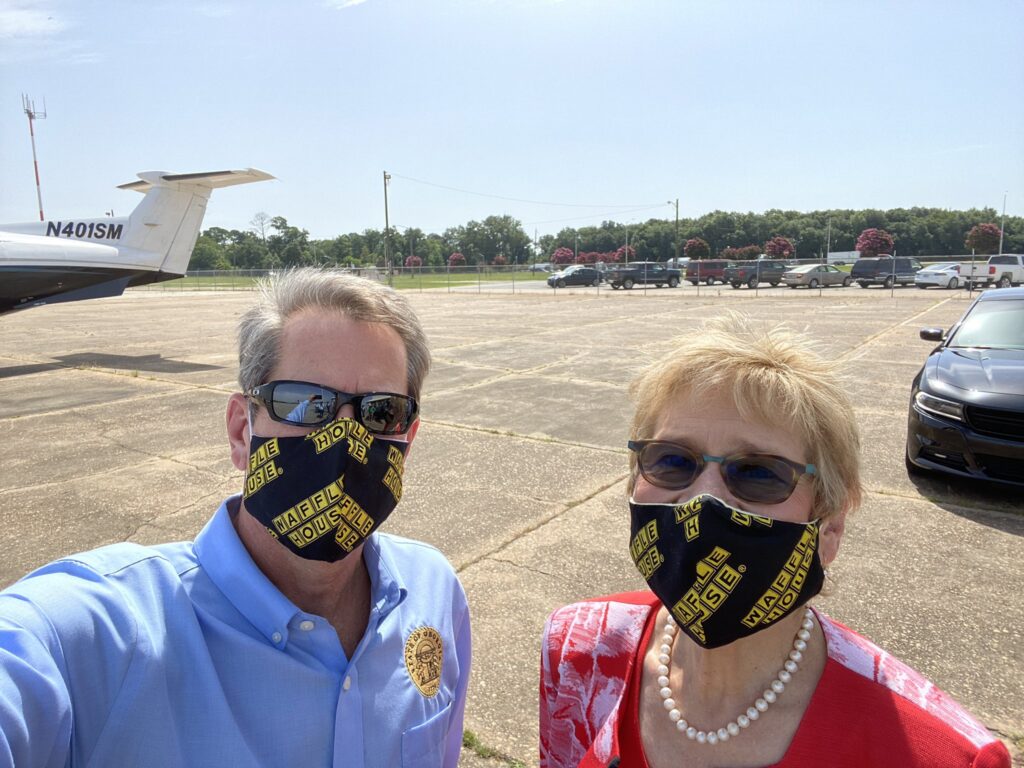
The evolving political back-and-forth on whether Georgia should require facial coverings in public entered a new phase this past week as Gov. Brian Kemp allowed cities and counties to mandate mask-wearing in many areas except homes and businesses amid the COVID-19 pandemic.
Several cities have joined Atlanta, Augusta and Savannah in requiring masks following Kemp’s decision last week to drop a lawsuit against Atlanta officials over masking rules and a rollback of shelter-in-place requirements.
Cities including Columbus, Milledgeville, Warner Robins, Smyrna and Sandy Springs passed measures in recent days requiring masks on city-owned public property, which squares with Kemp’s latest executive order.
Rockdale County also passed a mask mandate, and officials in LaGrange this week approved a measure authorizing police to enforce mask requirements at local businesses that choose to adopt them.
Other cities including Valdosta and Macon are poised to consider mandating facial coverings in the coming days. At least one city, Covington, has already shot down a mask mandate proposal.
The Georgia Municipal Association has not yet compiled a list of which Georgia cities have adopted local masking requirements but is working on one, according to a spokeswoman.
Meanwhile, Kemp has declined to issue a statewide mask mandate in the face of a White House coronavirus task force report drafted earlier this month that recommends imposing one, as the governor maintains his position that public mask-wearing should be strongly encouraged but voluntary.
“We take their recommendations, but it doesn’t mean that every governor is going to follow every one of them,” Kemp said at a recent news conference.
The governor has urged Georgians to wear masks, wash their hands and avoid large gatherings, and pressed local governments to enforce a statewide ban on gatherings larger than 50 people.
The White House recommendations found the vast majority of cities and counties in Georgia saw more than 100 new positive cases per 100,000 people and positivity rates higher than 10% in early August.
The report notes those numbers put Georgia in a “red zone” for coronavirus infections and recommends adopting a statewide mask mandate, boosting protections in elderly-care facilities and limiting gatherings to 10 people or fewer.
Kemp lashed out at news outlets during a news conference for reporting on the White House report without emphasizing more the state’s COVID-19 data, noting the state has seen a decline in hospitalizations and seven-day average infection rates since last month.
“To scare people with one number is not fair to the general public,” Kemp said. “You are not giving them the benefit of the doubt to make good decisions based on all the data.”
But Georgia’s image and allure for business investments has likely already taken a hit amid intense debate over masks and conflict between the governor and some local officials like Atlanta Mayor Keisha Lance Bottoms, said Charles Bullock, a political science professor at the University of Georgia.
“Georgia has not done well in terms of public relations with regard to this,” Bullock said. “Part of what a governor’s unwritten job involves is attracting new industries and investment to the state. I can’t imagine recent publicity involving coronavirus helps the state.”
Kemp dropped a lawsuit earlier this month that the state filed against the city of Atlanta over orders by Bottoms to require wearing masks in public and to reinstate a citywide shelter-in-place rule, which Bottoms later described as voluntary.
Shortly after, Kemp issued a new executive order that permits local governments in Georgia to impose mask mandates so long as they are not enforced in residences or on private property including businesses.
Rather than a mandate, the governor’s office last month launched a voluntary marketing campaign called the “Georgia Safety Promise” for businesses in the state to show they are keeping up with good social distancing, sanitizing and masking practices.
Restaurants in the state, which have been battered by the virus’ economic impacts, have mostly adopted masking practices for employees and customers since being allowed to reopen in late April, said Karen Bremer, CEO of the Georgia Restaurant Association.
Bremer, who helped launch the marketing campaign, said most Georgia restaurants have put up signs asking customers to wear masks on the premises and noted she has seen little resistance to facial coverings as restaurants seek to boost confidence that customers can dine safely.
“What I am hearing and I am seeing anecdotally is people wearing face coverings,” Bremer said in a recent interview. “There are not many [restaurants] that are not complying with that. I think there’s a social pressure there.”
The Georgia Chamber of Commerce also backs the mask-wearing marketing campaign as well as other cleanliness and distancing measures businesses can adopt to curb the virus’s spread.
“We encourage businesses to wear masks, practice social distancing, train staff and act responsibly,” said Lisa Sherman, the chamber’s external affairs vice president.
Still, a few instances of local businesses and residents opposed to wearing masks have cropped up in recent weeks. A group of residents in the Georgia city of Guyton near Savannah last month protested a mask mandate for all residents and visitors older than 11-years-old, the Effingham Herald reported.
Also, a Gwinnett County bakery and cafe drew attention this week for placing a sign outside the premises that read, “We do not wear mask[s], we do not do social distance,” CBS46 News reported. The station reported the bakery’s staff cited personal freedom in their decision to forgo masks.
Ultimately, as Georgia businesses weigh safety measures and ways to bring back customers, the focus should be on avoiding another widespread economic shutdown such as occurred during the statewide shelter-in-place order in April, said Clark Hungerford, president of Vinings Bank in Cobb County.
“We cannot afford that,” Hungerford said in a recent interview. “If we shut it down again, I don’t know that we ever get it restarted. That’s my biggest fear.”